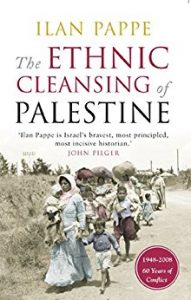The Ethnic Cleansing of Palestine

reviewed by Stephen Howe, The Independent, November 24, 2006 (One World Books). Stephen Howe is Professor of the history of colonialism, Bristol University
“The war of 1948 created Israel and destroyed Palestinian Arab society. Argument over that destruction has never ceased – continuously, often directly, reshaped by contemporary political developments. Ilan Pappe is surely wrong to suggest in this important, provocative book that the Palestinians’ fate has been “erased almost totally from the global public memory”. Rather, some ways of seeing it have been blocked, for political reasons and with great, sometimes vindictive energy, in particular places. The kind of view that Pappe presents has been held or maybe even heard only by a very small minority, in Israel and the US.”…
“Ideas about 1948, among both Israelis and Palestinians, mingle historical investigation, popular and official “memory”, political controversies and existential anxieties. For Palestinians, the events of 1948 have usually been called the nakba – translated as “disaster”.” …
“Most Palestinians feel…the end of the conflict must be linked to acknowledgment of and recompense for what happened in 1948. Israeli recognition of past injustice must, some go on, imply support for the refugees’ right of return. Pappe has been among the most forthright advocates of this view. That conviction makes his book a slightly uneasy, if also often compelling, mixture of historical argument and politico-moral tract. His fervour also makes him rather less than generous in acknowledging others’ work in the field.” (read more)
reviewed by Rajah Shehadeh, Institute of Palestine Studies, issue 33. under the title “Looking at Evil without blinking”. Rajah Shehadeh is an author and lawyer. He is the author of Palestinian Walks.
“I had always known that the reason why my aunt, Mary Kawar, stayed in Acre in 1948 was because her youngest daughter, Amal, contracted typhoid and she could nottravel. It was only after reading Ilan Pappe?¦s book The Ethnic Cleansing of Palestine,that I learned how she must have contracted the disease. Writing about the Hagana?¦s campaign to conquer Acre, Pappe describes how it proved ?§once again that it was notonly Napoleon who found it [Acre] hard todefeat.?¨ The Jewish forces then employed chemical warfare to subdue the city:?§typhoid germs were apparently injected into the water.?¨ Reporting to their headquarters, the local emissaries of the International Red Cross ?§describe a sudden typhoid epidemicand, even with their guarded language, pointto outside poisoning as the sole explanationfor this outbreak.?¨ According to Pappe, their reports to their headquarters left ?§very littleroom for guessing whom they suspected: theHagana?¨ .
“There are more revelations in Pappe?¦s book than this early use of chemical warfare. I grew up hearing about the massacre in Deir Yassin but did not know that it was one of scores of massacres that had been planned and perpetrated by the Zionist forcesthroughout Mandate Palestine. The weight of historical evidence, as well as the graphic and detailed descriptions of specific atrocities that Pappe delineates to provehis case that the Zionists were guilty of the war crime of ethnic cleansing in Palestine,in themselves make the book worth reading.”
“As intriguing, perhaps, was the confrontation with that history that I, and perhaps other Palestinian readers, experienced in reading this valuable book. It made me realizehow much of this history I had been suppressing. How skeptical I had become, howdefensive against acknowledging many of these horrors. I had chosen to relieve myself from the full admission of the war crimes that my family and people had endured.It was not a book I could read in one go. That my parents did not tell me more is not surprising. The psychology of losers is not to speak out, but rather to blame themselves (not unlike what is now taking place in Palestinian society). In the case ofmy father, it was also to pick himself up and get on with his life rather than dwell on the losses. This is not unlike the children of Holocaust survivors who became silent when faced with the atrocity. It is only those who make an industry of catastrophe who dramatize and sensationalize.” (read more)
